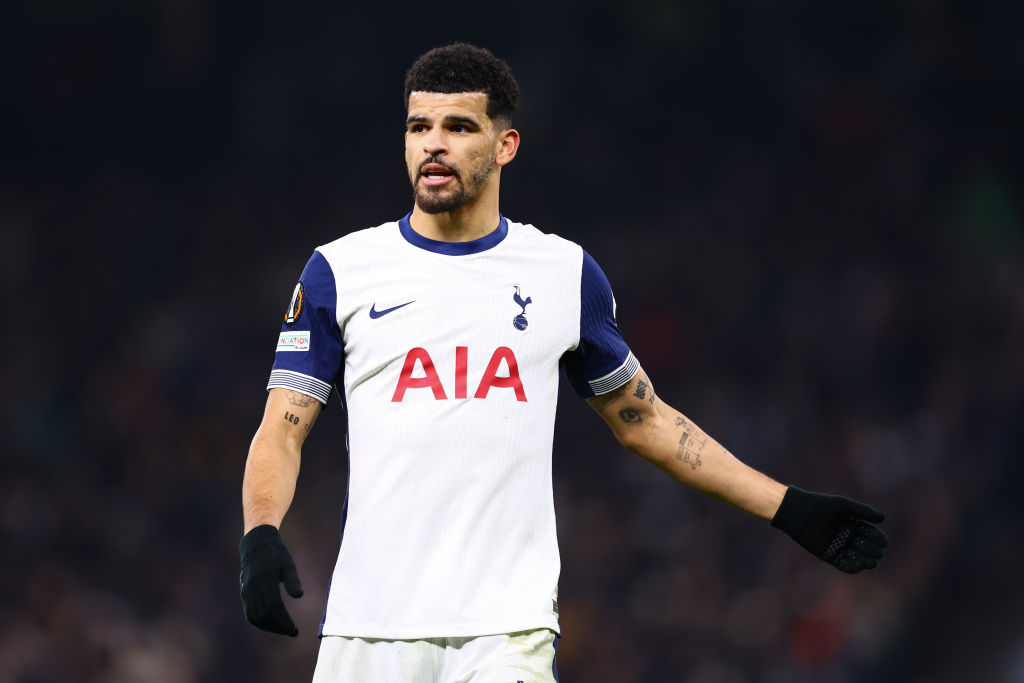The making of Ronaldinho – how the Brazilian superstar broke through at PSG
Looking back at the season Ronaldinho broke onto the European scene, which ended with him in magical form and heading to the World Cup
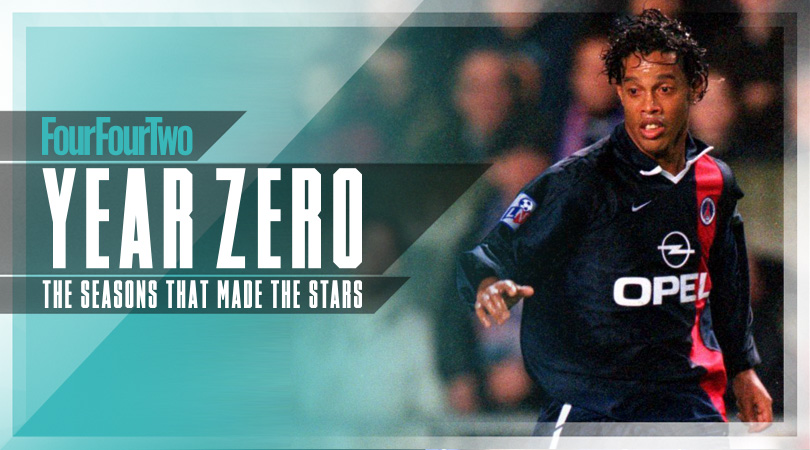
Alone and unwanted in the heart of France's wine region, Ronaldinho could have been forgiven for craving a stiff drink. It was the end of September 2001 and as Paris Saint-Germain slumped to a 1-0 defeat at Bordeaux, their star attacker was slumped on the bench, an unused substitute for a side that needed a goal.
For two years, he had illuminated Brazilian football to a drumbeat of deafening hype, but six months after leaving his homeland, the 21-year-old boy wonder looked like a busted flush. He had chosen Paris for first-team football but so far he had made just two starts. Now he couldn't even get off the bench.
With the 2002 World Cup on the horizon, he hadn't kicked a ball for his country in six months. Things were not going to plan.
Ronaldinho was already a star when he touched down at Charles de Gaulle Airport in July 2001 to become a PSG player. Back in Brazil, he’d been the talk of a nation since bursting onto the scene as a gangly teenager for his boyhood club Gremio.
His first invasion of the national consciousness had come in the final of the state championship in 1999 when, playing against local rivals Internacional, the 18-year-old managed to humiliate the country’s World Cup-winning captain Dunga with outrageous skill on two separate occasions, the first in particular a moment of absurdist, elastic-limbed wizardry.
Ronaldinho was promptly whisked off to the Copa America, and summoned from the bench in Brazil’s opener against Venezuela. He took precisely four minutes to score a sumptuous individual goal, flicking the ball over his marker’s head before boisterously blamming it home.
It was his Michael Owen in Saint-Etienne moment. A nation sat up and took note – as did a small army of scouts from across Europe.
Get FourFourTwo Newsletter
The best features, fun and footballing quizzes, straight to your inbox every week.
The events of the next 24 months could fill a Russian novel. As Ronaldinho continued to sparkle on the pitch, whispers of interest from Real Madrid and Barcelona were constant from the Spanish press, while in Italy, Massimo Moratti's Inter – spearheaded by a peak-era Ronaldo – were desperate to unite the two compatriots at club level.
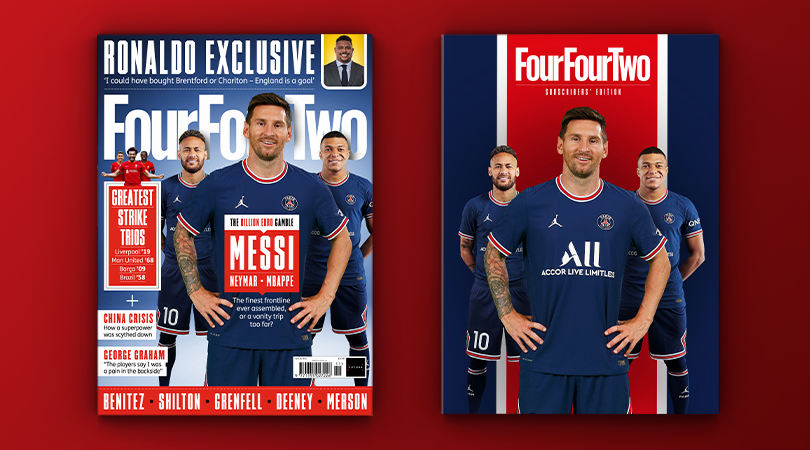
Borussia Dortmund wanted him, and Arsene Wenger was keen too, but any move to Arsenal fell through due to work-permit issues. In one delightful ‘sign of the times’ moment, Gremio even claimed to have received a £42m offer from a shady group of agents representing Leeds United (the world record fee at the time was £37m).
During Ronaldinho’s final season at Gremio, in which he scored 41 times in 49 games, press speculation eventually became too much for club president Jose Guerreiro, who simply hung a giant banner across the entrance to the training ground that read: ‘We don’t sell our best players’.
In the end, Ronaldinho sprang a surprise, shunning his army of aristocratic admirers for the Parc des Princes. The choice was both strategic and personal. He figured his move to Europe might be best served in the long term by a comparatively low-key first step, and with a World Cup looming he couldn't risk languishing in the reserves of a super-club.
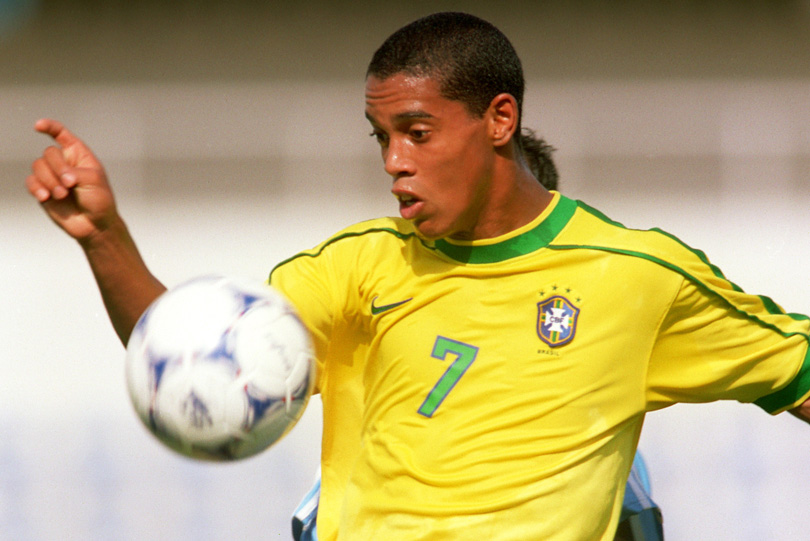
The fact that his brother, a middling footballer himself, was able to wangle a move to Montpellier that summer meant the whole family could move to France together: smiles all round.
Except at Gremio. Taking advantage of a newly passed legislation, effectively a Brazilian version of the Bosman ruling, Ronaldinho signed a pre-contract agreement with PSG in December 2000 that would see him move in the summer. The hitch? There’d be no fee. (One popular theory is that the move was an act of vengeance on part of his brother – later to become his agent – who was forced out of Gremio in the early 90s, the club having declined to renew his contract after a bad injury.)
Matters were not smoothed by the fact that the first Gremio heard of the arrangement was once it was all done and dusted. "I've just read the news on PSG's website,” said Guerreiro. “We are in the middle of negotiations to renew Ronaldinho's contract and PSG have never contacted us."
The fans were similarly bitter. “Ronaldinho left Gremio with nothing and they have suffered from it since,” said a senior ultra some years later. “For us he is a liar and a traitor.”
As Gremio and PSG took their warfare to the courts, FIFA ruled that Ronaldinho could not play again until the matter was settled, and so the ties to his boyhood club were abruptly severed. He spent his days living in Rio, 1,500 miles from home, training alone and taking French lessons in his spare time.
Ronaldinho was rusting away in the stands, his agent trying in vain to engineer a short-term loan to St Mirren to get him fit
By the time he arrived in Paris in April, he hadn’t kicked a ball competitively for four months, and worse still the ongoing legal battle meant his ban had no end in sight. “It was a tough moment,” he later recalled. While his new team-mates limbered up for the new season with an Intertoto Cup win, Ronaldinho was rusting away in the stands, his agent trying in vain to engineer a short-term loan to St Mirren to get him fit. FIFA were having none of it.
Ronaldinho would never play for a British club, but his new squad was dotted with former and future Premier League stars. Their captain was a stern-faced Argentine by the name of Mauricio Pochettino (then replete with flowing, shoulder-length locks), who manned a defence containing a young Gabriel Heinze and screened by a tidy 19-year-old midfielder on loan from Barcelona, Mikel Arteta.
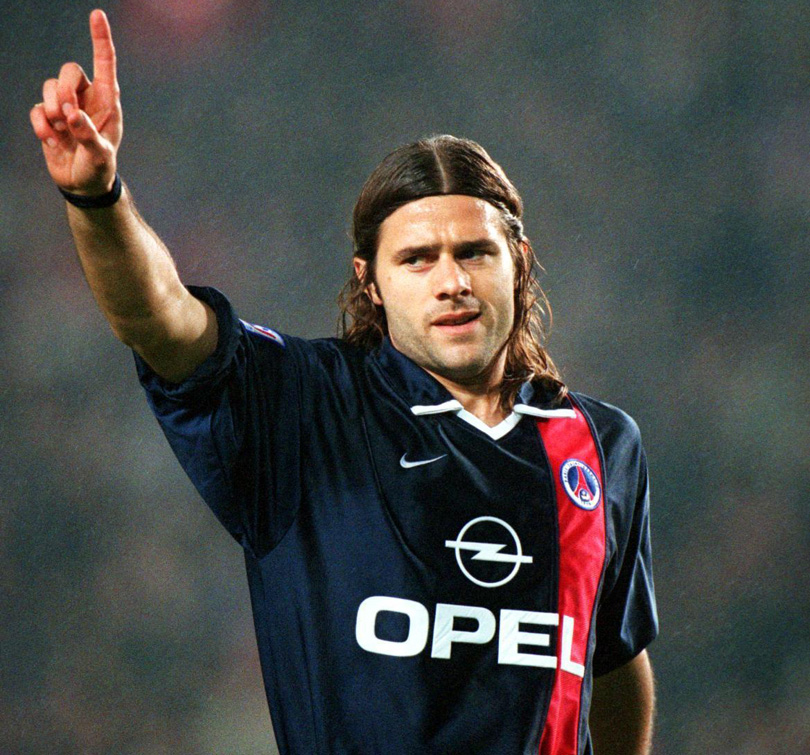
Up top, Ronaldinho would be tasked with working his magic alongside Jay-Jay Okocha, who, sensing a like-minded entertainer in the ranks, took the new man under his wing. “He was like my kid brother. I realised he was just so talented and he just needed someone to guide him,” he’s since said. Their task was to feed Nicolas Anelka, who had returned home the previous summer after a grim year at Real Madrid.
Despite all their latent talent, though, PSG were stuck in a rut. The previous season had seen them drop from runners-up to 9th. And to make room for the Brazilian, PSG had dispatched the previous season’s top scorer, the granite-thighed winger Laurent Robert, to Newcastle for a club-record £9.5m. Ronaldinho’s new employers needed him to hit the ground running.
Finally, in mid-August, in time for the second league game of the season, FIFA lifted Ronaldinho's ban. “Once I was able to play, everything changed,” he later recalled. Except it didn't. His debut, from the bench at Auxerre, was greeted by a guttural roar from the travelling fans but his performance was unremarkable. As was the result, a 1-1 draw that heralded a run of two wins in 10 for the limp Parisians.
As autumn faded, Ronaldinho’s misery did not. PSG were down in 8th and the new boy, limited largely to cameos off the bench, was struggling badly. Laboured, lightweight and with a maddening tendency to over-elaborate even the simplest tasks, it wasn’t obvious how the Brazilian would ever represent an upgrade on the proven pedigree of Robert.
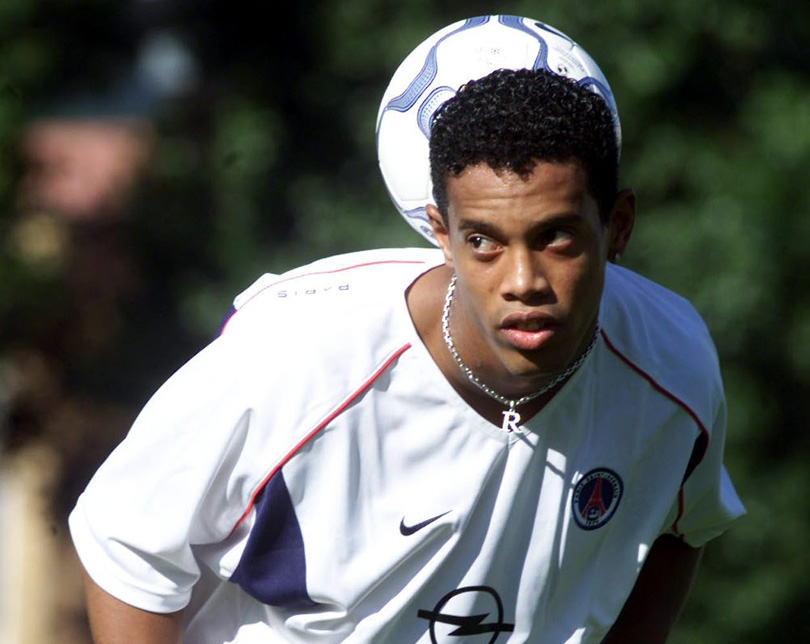
Anelka, perma-scowl plastered across his brow, was yet to rid himself of the bleak form that had blighted him since moving to Madrid. The press weren’t shy of laying into an ostensibly thrilling forward line that was serving up mediocrity.
It got worse. Back in Brazil, whispers were growing about a cherubic 19-year-old called Kaka, a free-roaming attacker who played in exactly Ronaldinho's position and who couldn’t stop scoring for Sao Paolo. Suddenly it was Kaka who the smart money was on to start alongside Ronaldo and Rivaldo at the World Cup.
At Bordeaux, on September 30, a nadir was reached. Ronaldinho kicked his heels on the bench as his countryman Alex Dias – a journeyman striker who would be playing second-tier football the following season – was sent on in his stead.
Seven days later, with PSG trailing 2-1 at home to league leaders Lyon, came something of a turning point. Ronaldinho was sent on this time, and after eight minutes he bisected the visitors’ defence with a pass to Bartholomew Ogbeche, who spotted a defender coming and hit the ground with thespian flourish.
As Lyon's players crowded around the referee, Ronaldinho marched over to the ball and picked it up, determined to take the spot-kick. He stepped up and drilled the ball into the bottom corner to rescue a point. Finally, he had his first goal. “I've been waiting for that for a while,” he said. “It will bring me a little more confidence. I will play with more freedom now.”
He wasn’t wrong. Four days later was a UEFA Cup tie against Rapid Vienna. Ronaldinho scored twice, the first a free-kick from out wide – the precursor to that goal against England in 2002 – that bounced beyond a flummoxed goalkeeper into the corner; the second smashed home after a snake-hipped dance into the box.
With half an hour to go and PSG four goals to the good, he brought out the elastico trick that would become his signature, leaving his marker flailing wildly at thin air. For the first time, Ronaldinho was starting to enjoy himself.
The following month came another Ronaldinho-inspired turnaround, this time in the most testing conditions possible: PSG were 1-0 down at champions Nantes, and down to 10 men after half an hour. Summoned again at half-time, the Brazilian sparked a second-half fightback which he capped with a gorgeously taken winner.
Collecting a pass on the edge of the box, he spun towards goal, shimmied between two defenders and swept the ball into the bottom corner of the net, all in a single swift action.
It was a sumptuous bit of play, as efficient as it was ebullient, and executed with the loose-limbed aplomb he would become famed for. A knock in the following game would rule him out until the winter break – but, slowly, Ronaldinho was clanking into gear.
Over Christmas, without a ball being kicked, everything changed. Okocha, who had been jostling with Ronaldinho for playmaking duties, jetted off to Mali for six weeks at the Africa Cup of Nations. And with friction between a morose Anelka and the disciplinarian boss Luis Fernandez at breaking point, the striker was ushered out of the exit, on loan to Liverpool.
A dysfunctional strikeforce had been shredded and the implications for Ronaldinho were clear: he would now be its central figure.
In PSG’s first game back, against Monaco, he was duly granted a start and capped a lively showing with a penalty – not enough to avoid defeat, but promising nonetheless. Three days later against Guingamp he produced a truly sensational performance, once again after coming on at half-time. This time he scored a brace, the second slotted home after a rampant 50-yard sprint, to secure the win.
“I adapt little by little, but I am far from being 100%,” he said. “I want to give joy to the public.”
He did exactly that by netting in each of PSG’s next two league games – including a soon-to-be-trademark free-kick, whipped over the wall with that one-step, 90-degree run-up – before puppeteering a marquee 5-0 win over Lorient.
Ronaldinho scored once, laid on another two and came within a whisker of a true highlight-reel goal, only to be felled at the last having weaved his way through a 20-yard herd of flailing defenders. Ronaldinho’s campaign was up and running at last.
If he had so far only hinted at the match-winning, something-from-nothing moments of which he would go on to build an entire back catalogue, the visit of Troyes in mid-March provided concrete evidence.
To continue the emerging theme of his season, he saved his best display for a game when his side were 1-0 down. Having delivered the swirling corner for Aloisio to bullet in an equaliser, Ronaldinho then burst into the area to give himself a one-on-one. He sent the Troyes keeper the wrong way with a twist of the hips – but not a touch of the ball – before sidestepping the prone figure to slot home.
It was his standout moment of the season, yet 10 minutes later he bettered it. Collecting a pass well inside his own half, he vaulted a despairing lunge on the halfway line and stampeded towards goal, beating another defender, coaxing a helpless goalkeeper into no man’s land and rolling the ball into the far corner with a nonchalance that bordered on contempt.
“Two goals that will feed his gallery of personal masterpieces,” reported Le Parisien’s back pages the next morning. “An exceptional performance, the measure of a player with unbelievable class.”
His barnstorming late-season form was capped with a goal in PSG’s final home game of the season, some high-class goalkeeping buffoonery allowing Ronaldinho to sidle towards goal and flick the ball playfully over a defender into an unguarded net with playground glee.
It had been a whirlwind half-season. Seven months since he sat in misery in Bordeaux, his big move looking for all the world like a grave misstep, Ronaldinho had confirmed himself as PSG’s best and most important player. The affection of his new fans had been truly won.
He had started precisely half of PSG’s league games, but finished the season as his club’s top scorer and was voted into the Ligue 1 team of the season. A week later, Brazil manager Luiz Felipe Scolari named his squad for Japan and South Korea. By that stage there was no doubt the resurgent Ronaldinho would be in it.
But his breakthrough season did not instantly set him on the fast track to superstardom. In some ways, he actually regressed the campaign that followed – the Brazilian managed a similar goal tally despite his new leading-man status, but was blighted by ever-fiercer squabbles with his manager, who took exception to his star player’s habitual jaunts back to Brazil and frequenting of the local Stringfellows. (“It seems to bother him that I am happy,” huffed the beleaguered Brazilian).
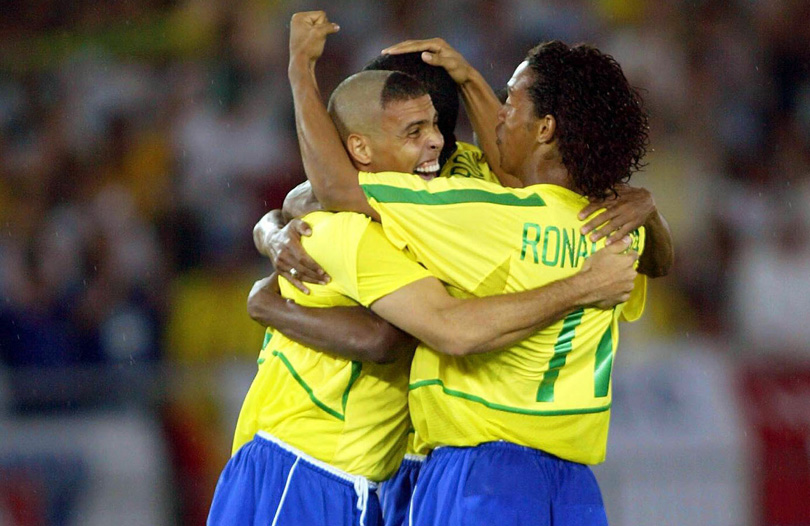
“Some persist in the belief that Ronaldinho is a fantastic football player,” wrote The Guardian in February of that year. “But that is old news. He was a fantastic football player.” Premature poppycock, of course – but indicative nonetheless.
And yet, looked at from another angle, the so-called regression wasn’t that at all, but merely the flip-side of the very qualities that made Ronaldinho such a singularly sublime player: ease, enjoyment, a profound sense of relaxation. Things, in other words, that he could not call on when he arrived in Paris but that he had certainly discovered by the summer of 2002.
Football has arguably produced more talented players than Ronaldinho, and certainly more efficient ones. But there have been none more joyously exuberant, none who have fused business and pleasure with such blistering effect.
For that reason alone, Ronaldinho’s first season in Paris is perhaps the essential chapter in a career that would reach its various peaks elsewhere. Although in pleasingly neat fashion, the high point of his club career would come back in the French capital, where Barcelona won the Champions League in 2006. “We had a massive party in Paris after the game,” he recalled. “I had many friends there. It was a great night.”
And besides, it’s not as if the short-term effects weren’t plain enough, too. Within two months of signing off for the summer with PSG, Ronaldinho was lifting the World Cup, a key figure in an exhilarating Brazil side and his reputation as the world's most thrilling young attacker confirmed.
A year after that he was on a plane to Barcelona, with the infamous words of an unnamed Real Madrid executive – “He is so ugly that he’d sink you as a brand” – ringing in his ears. The rest, as they say, is history.
Subscribe to FourFourTwo today and get three issues delivered for just £3.
Restock your kit bag with the best deals for footballers on Amazon right now
ALSO READ
GUIDE Best football gifts: Present ideas for football fans
SAVE Best Football Manager 2022 deal: Save over 30% on FM22 pre-orders with this FourFourTwo code
